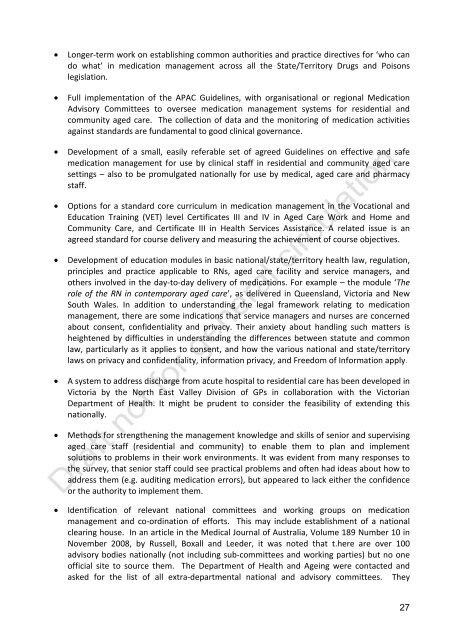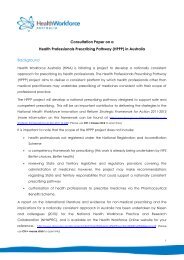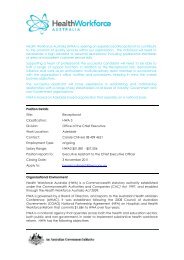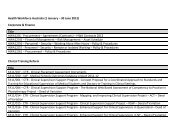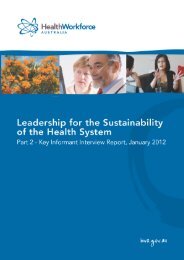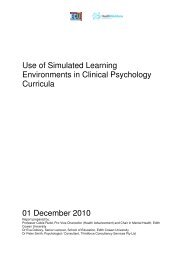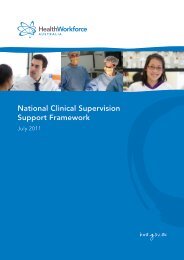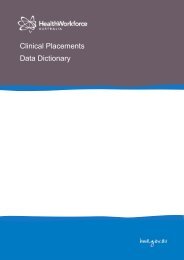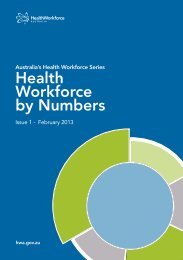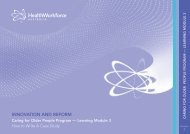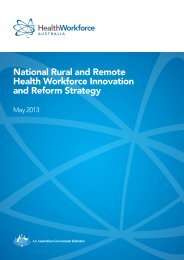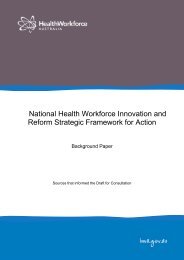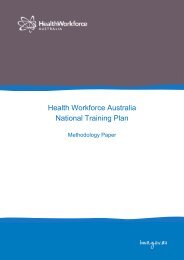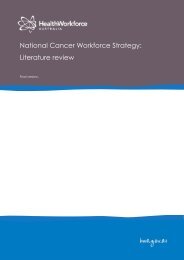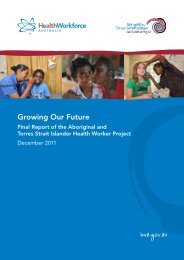SUMMARY - Safe Medications Management project: Key issues and ...
SUMMARY - Safe Medications Management project: Key issues and ...
SUMMARY - Safe Medications Management project: Key issues and ...
You also want an ePaper? Increase the reach of your titles
YUMPU automatically turns print PDFs into web optimized ePapers that Google loves.
Longer-term work on establishing common authorities <strong>and</strong> practice directives for ‘who c<strong>and</strong>o what’ in medication management across all the State/Territory Drugs <strong>and</strong> Poisonslegislation.Full implementation of the APAC Guidelines, with organisational or regional MedicationAdvisory Committees to oversee medication management systems for residential <strong>and</strong>community aged care. The collection of data <strong>and</strong> the monitoring of medication activitiesagainst st<strong>and</strong>ards are fundamental to good clinical governance.Development of a small, easily referable set of agreed Guidelines on effective <strong>and</strong> safemedication management for use by clinical staff in residential <strong>and</strong> community aged caresettings – also to be promulgated nationally for use by medical, aged care <strong>and</strong> pharmacystaff.Options for a st<strong>and</strong>ard core curriculum in medication management in the Vocational <strong>and</strong>Education Training (VET) level Certificates III <strong>and</strong> IV in Aged Care Work <strong>and</strong> Home <strong>and</strong>Community Care, <strong>and</strong> Certificate III in Health Services Assistance. A related issue is anagreed st<strong>and</strong>ard for course delivery <strong>and</strong> measuring the achievement of course objectives.Development of education modules in basic national/state/territory health law, regulation,principles <strong>and</strong> practice applicable to RNs, aged care facility <strong>and</strong> service managers, <strong>and</strong>others involved in the day-to-day delivery of medications. For example – the module ‘Therole of the RN in contemporary aged care’, as delivered in Queensl<strong>and</strong>, Victoria <strong>and</strong> NewSouth Wales. In addition to underst<strong>and</strong>ing the legal framework relating to medicationmanagement, there are some indications that service managers <strong>and</strong> nurses are concernedabout consent, confidentiality <strong>and</strong> privacy. Their anxiety about h<strong>and</strong>ling such matters isheightened by difficulties in underst<strong>and</strong>ing the differences between statute <strong>and</strong> commonlaw, particularly as it applies to consent, <strong>and</strong> how the various national <strong>and</strong> state/territorylaws on privacy <strong>and</strong> confidentiality, information privacy, <strong>and</strong> Freedom of Information apply.A system to address discharge from acute hospital to residential care has been developed inVictoria by the North East Valley Division of GPs in collaboration with the VictorianDepartment of Health. It might be prudent to consider the feasibility of extending thisnationally.Methods for strengthening the management knowledge <strong>and</strong> skills of senior <strong>and</strong> supervisingaged care staff (residential <strong>and</strong> community) to enable them to plan <strong>and</strong> implementsolutions to problems in their work environments. It was evident from many responses tothe survey, that senior staff could see practical problems <strong>and</strong> often had ideas about how toaddress them (e.g. auditing medication errors), but appeared to lack either the confidenceor the authority to implement them.Identification of relevant national committees <strong>and</strong> working groups on medicationmanagement <strong>and</strong> co-ordination of efforts. This may include establishment of a nationalclearing house. In an article in the Medical Journal of Australia, Volume 189 Number 10 inNovember 2008, by Russell, Boxall <strong>and</strong> Leeder, it was noted that t.here are over 100advisory bodies nationally (not including sub-committees <strong>and</strong> working parties) but no oneofficial site to source them. The Department of Health <strong>and</strong> Ageing were contacted <strong>and</strong>asked for the list of all extra-departmental national <strong>and</strong> advisory committees. They27


